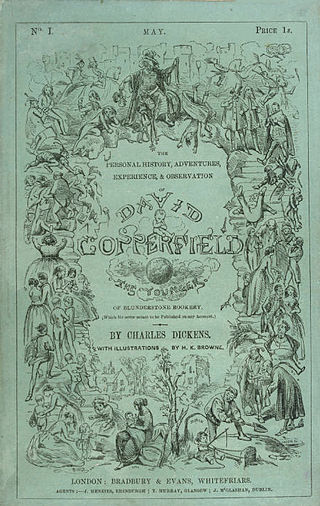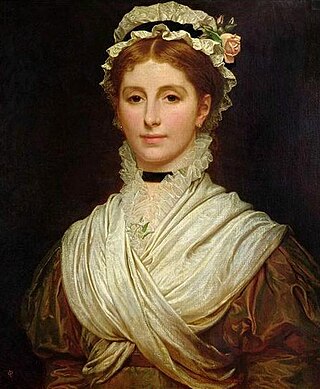Related Research Articles

David Copperfield is a novel by English author Charles Dickens, narrated by the eponymous David Copperfield, detailing his adventures in his journey from infancy to maturity. As such, it is typically categorized in the bildungsroman genre. It was published as a serial in 1849 and 1850 and then as a book in 1850.

Magdalene asylums, also known as Magdalene laundries, were initially Protestant but later mostly Roman Catholic institutions that operated from the 18th to the late 20th centuries, ostensibly to house "fallen women". The term referred to female sexual promiscuity or sex workers, young women who became pregnant outside of marriage, or young girls and teenagers who did not have familial support. They were required to work without pay apart from meagre food provisions, while the institutions operated large commercial laundries, serving customers outside their bases.

Angela Georgina Burdett-Coutts, 1st Baroness Burdett-Coutts was a British philanthropist, the daughter of Sir Francis Burdett, 5th Baronet and Sophia, formerly Coutts, daughter of banker Thomas Coutts. In 1837 she became one of the wealthiest women in England when she inherited her grandfather's fortune of around £1.8 million following the death of her stepgrandmother, Harriot Beauclerk, Duchess of St Albans. She joined the surnames of her father and grandfather, by royal licence, to become Burdett-Coutts. Edward VII is reported to have described her as "[a]fter my mother, the most remarkable woman in the kingdom".

The Contagious Diseases Acts were originally passed by the Parliament of the United Kingdom in 1864, with alterations and additions made in 1866 and 1869. In 1862, a committee had been established to inquire into venereal disease in the armed forces. On the committee's recommendation the first Contagious Diseases Act was passed. The legislation allowed police officers to arrest women suspected of being prostitutes in certain ports and army towns. Since there was no set definition of prostitution within the Act, the question was left to the police officer’s discretion, and women could be arrested even if there was no actual evidence of prostitution. The women were then subjected to compulsory physical examinations for venereal disease. If a woman was declared to be infected, she would be confined in what was known as a lock hospital until she recovered or her sentence was completed. Men suspected of frequenting prostitutes were not subjected to the same treatment of compulsory checks and confinement. The law was initially aimed at working-class women in towns near military bases, due to the concern that sexually transmitted infections were hampering Britain’s forces. The original act only applied to a few selected naval ports and army towns, but by 1869 the acts had been extended to cover eighteen "subjected districts".

Coutts & Co. is a British private bank and wealth manager headquartered in London, England.

Sister Irene was an American nun who founded the New York Foundling Hospital in 1869, at a time when abandoned infants were routinely sent to almshouses with the sick and insane. The first refuge was in a brownstone on E.12th St. in Manhattan, where babies could be left anonymously in a receiving crib with no questions asked. The practice was an echo of the medieval foundling wheel and an early example of modern "safe haven" practices.

Catherine Elizabeth Macready Perugini was an English painter of the Victorian era and the daughter of Catherine Dickens and Charles Dickens.

Susanna Meredith was a 19th-century Irish-born prison visitor and pioneer for the rehabilitation of female prisoners.

Mary "Mamie" Dickens was the eldest daughter of the English novelist Charles Dickens and his wife Catherine. She wrote a book of reminiscences about her father, and in conjunction with her aunt, Georgina Hogarth, she edited the first collection of his letters.

Columbia Road Flower Market is a street market in Bethnal Green in London, England. Columbia Road is a road of Victorian shops situated off Hackney Road in the London Borough of Tower Hamlets. The market is open on Sundays only.

Hetty Feather is a book by English author Jacqueline Wilson. It is about a young red-haired girl who was left by her mother at the Foundling Hospital as a baby and follows her story as she lives in a foster home before returning to the Foundling Hospital as a curious and bad-tempered five-year-old. There are more books to the "series" of Hetty Feather, which are recommended for ages 9–11 according to the author. CBBC created a TV series based on the book, with Isabel Clifton portraying Hetty. The programme was first aired in 2015. In the United States BYUtv has the US broadcast rights and began airing it in March 2018.
Lady Arabella Fitzmaurice Denny (1707–1792) was an Irish philanthropist, and founder of the Magdalen Asylum for Protestant Girls in Leeson Street, Dublin in 1765.

Elizabeth Culliford Dickens was the wife of John Dickens and the mother of British novelist Charles Dickens. She was the source for Mrs. Nickleby in her son's novel Nicholas Nickleby and for Mrs Micawber in David Copperfield.

"Fallen woman" is an archaic term which was used to describe a woman who has "lost her innocence", and fallen from the grace of God. In 19th-century Britain especially, the meaning came to be closely associated with the loss or surrender of a woman's chastity and with female promiscuity. Its use was an expression of the belief that to be socially and morally acceptable, a woman's sexuality and experience should be entirely restricted to marriage, and that she should also be under the supervision and care of an authoritative man. Used when society offered few employment opportunities for women in times of crisis or hardship, the term was often more specifically associated with prostitution, which was regarded as both cause and effect of a woman being "fallen". The term is considered to be anachronistic in the 21st century, although it has considerable importance in social history and appears in many literary works.

Dodger is a novel written by Terry Pratchett, set in early Victorian London, and inspired by Charles Dickens's character the Artful Dodger. The book was released on 13 September 2012 in the UK.

Richmond Royal Hospital, on Kew Foot Road in Richmond, London, England, is a mental health facility operated by South West London and St George's Mental Health NHS Trust, which has its headquarters at Springfield Hospital in Tooting. The hospital's original block is Grade II listed.

William Henry Wills JP was a British journalist, playwright, a newspaper editor and a close friend and confidant of the author Charles Dickens, who entrusted Wills with the task of forwarding his letters to his mistress Ellen Ternan.

The Glasgow Magdalene Institution was an asylum in Glasgow, Scotland, initially started in 1812 and was open until 1958.
Stacey Nicole Halls is an English author of gothic historical fiction. Her debut novel The Familiars (2019) became a Sunday Times bestseller and earned a Betty Trask Award. This was followed by further bestsellers The Foundling (2020) and Mrs England (2021). Halls won the 2022 Women's Prize x Good Housekeeping Futures Award.

Urania Cottage was a Magdalene asylum, in the terminology of the time, hostel or women's shelter, founded in London in 1847 by the novelist Charles Dickens and the philanthropist Angela Burdett-Coutts.
References
- ↑ "To Georgiana Morson, 1849". dickensletters.com. 24 February 2021.
- ↑ Millward, David (8 July 2001). "How Dickens helped fallen girls". Daily Telegraph. ISSN 0307-1235 . Retrieved 12 January 2019.
- 1 2 "Georgiana Morson". Spartacus Educational. Retrieved 17 November 2018.
- ↑ "Urania Cottage". Spartacus Educational. Retrieved 17 November 2018.
- 1 2 Healey, Edna (23 September 2004). "Coutts, Angela Georgina Burdett-, suo jure Baroness Burdett-Coutts (1814–1906), philanthropist". Oxford Dictionary of National Biography . Oxford Dictionary of National Biography (online ed.). Oxford University Press. doi:10.1093/ref:odnb/32175.(Subscription or UK public library membership required.)
- ↑ Hartley, Jenny (2009). Charles Dickens and the House of Fallen Women. Methuen. ISBN 978-0413776440.
- 1 2 Tomalin, Claire (20 December 2008). "The House That Charles Built". Guardian. Retrieved 18 November 2022.
- 1 2 Ben (3 June 2018). "To the Governors of the Foundling Hospital, 9 July 1852". www.dickensletters.com. Retrieved 17 November 2018.